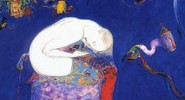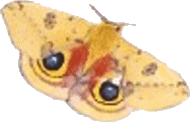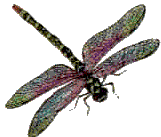Thursday, December 12, 2002
LOST IN TRANSLATION
A visit to Stacey's blog earlier today -- where he was taunting visitors with a cryptic bit in Japanese script -- which I, even though I'm half Japanese, couldn't read, got me to thinking about bilingualism and, more specifically, my lack thereof. My mother must have spoken Japanese to me as an infant and a toddler, because when I first started talking I spoke in a form of Japanglish that was apparently somewhat indecipherable to everyone but myself. My mother immediately panicked and stopped speaking to me in Japanese. One of her greatest fears was that I wouldn't speak proper English, and as my father was an English professor, she felt that my English-speaking skills would be under close scrutiny by the populace at large, and that she would be blamed if I was English "handicapped." This seems like a strange way of thinking now, perhaps, but my parents were married in the 1950's during the post-WWII occupation in Japan, and at that point in time, theirs was still considered a highly radical interracial marriage.
It's a strange thing, not being able to speak your mother's tongue. Although, in point of fact, I do know a handful of phrases and words . . . mostly words to do with food or (as Stacey also mentioned to me) a good chunk of potty talk, too. And it's also true that when my mother's Japanese friends would come to visit, they would often forget to switch to English and ask me questions in Japanese, which I would then answer in English. My mother would always be surprised and ask me later on how I knew what they were saying. It wasn't that I could translate verbatim, by any means . . . and I'd only recognize a sprinkling of words here and there . . . but somehow I always instinctively knew what the conversations were about. The small amount of Japanese that I do know falls much more easily, almost naturally, from my tongue than the German or French that I studied in college, perhaps from always having had the intonations and rhythms of the Japanese language in my ear. Is it possible that people come into the world "hard-wired" for a particular language? And if so, what does it mean to have given up a tongue that one otherwise might have been destined to have spoken? And if language is truly the filter through which we perceive and interact with the world, might we all be completely different people altogether if we spoke a different language?
Several years ago there was a marvelous discussion in an on-line Asian American writer's group that I belonged to about how many of us seemed to have had some type of early "thorniness" with a missing or lost second language early on during our childhoods. It was suggested that perhaps this was even one of the things that informed, at least in part, our need to write. I love this notion of there being a second "lost" self, a Japanese-speaking self, a "ghostly double" self that could possibly be recovered through the act of writing. Recovered, ironically, through an obsession over mastery of the English language, at that. A second self that isn’t always divided into halves -- American and Japanese. A second self that could speak to her own mother in her mother’s native tongue.
The gaps in translation, the things that don’t get said, are funny and awful at the same time. When my first book of poetry came out in 1999, my mother took the volume to her ESL class at the University to show her ESL buddies. One of her Chinese friends read the first poem in the book, “Pearls.” When I was a child, I used to love the sound of my mother speaking Japanese on the telephone. I thought it sounded so beautiful, like the sound of birds, maybe sparrows, and I used to think that she knew how to speak the language of birds. Inside my head, I had a special name for it. I called it “bird talk.” The poem “Pearls” was written in the voice of a child, and early on in the poem the speaker says that her mother “does bird talk” when the Mormons come to the door . . . which was true, my mother used to speak Japanese and pretend she didn’t understand English to make them go away. Well, my mother’s Chinese ESL friend read that line and said to my mother, “Bird talk? Is she mean like pigeon?” Which my mother then took to mean, “Is she mean like pidgin?” As in Pidgin (Pigeon) English. And no amount of explanation on my part ever since has convinced my mother that this is not a poem in which I’m accusing her of speaking Pidgin English.
I would like to learn to speak Japanese. I would like to go to Japan someday. At my age, the acquiring of a second language, hard-wired or not, is difficult and slow-going, though. I have a computer program that is quite good that I work with, on and off, and although I have made some small progress, I can really only say the most trivial and absurd things. O-hayo gozai-masu. Good morning. Sakana wa oyoide masu. The fish is swimming. My mother is 72, and time is running out. How will I ever be able to ask her the important questions? How will I be able to understand her answers? Will she always be asking me in Japanese, then, and will I always answer in English -- leaving to faith that the part which gets lost in translation will somehow be instinctively known?
There was a book that I loved when I was a child in which a girl’s favorite doll was magically given the ability to speak for one hour, and during that one hour the girl and her doll had to say all the things to each other that went unsaid before, and would go unsaid afterwards. I loved this book, in part, because I was an only child, and the thought of having my dolls and animals talk out loud to me in real life, instead of my imagination, was, of course, highly appealing. Now I think that maybe I loved that story so much because I was a girl whose Japanese mother stopped sharing things with her in Japanese because she wanted her daughter to speak only perfect American English. I sometimes wonder if I could speak Japanese fluently for one hour, what my mother and I would say to each other. Sometimes I call her on the phone and practice my Pigeon Japanese on her. O-hayo gozai-masu, I say. Sakana wa oyoide masu. She laughs, and answers me in English.
A visit to Stacey's blog earlier today -- where he was taunting visitors with a cryptic bit in Japanese script -- which I, even though I'm half Japanese, couldn't read, got me to thinking about bilingualism and, more specifically, my lack thereof. My mother must have spoken Japanese to me as an infant and a toddler, because when I first started talking I spoke in a form of Japanglish that was apparently somewhat indecipherable to everyone but myself. My mother immediately panicked and stopped speaking to me in Japanese. One of her greatest fears was that I wouldn't speak proper English, and as my father was an English professor, she felt that my English-speaking skills would be under close scrutiny by the populace at large, and that she would be blamed if I was English "handicapped." This seems like a strange way of thinking now, perhaps, but my parents were married in the 1950's during the post-WWII occupation in Japan, and at that point in time, theirs was still considered a highly radical interracial marriage.
It's a strange thing, not being able to speak your mother's tongue. Although, in point of fact, I do know a handful of phrases and words . . . mostly words to do with food or (as Stacey also mentioned to me) a good chunk of potty talk, too. And it's also true that when my mother's Japanese friends would come to visit, they would often forget to switch to English and ask me questions in Japanese, which I would then answer in English. My mother would always be surprised and ask me later on how I knew what they were saying. It wasn't that I could translate verbatim, by any means . . . and I'd only recognize a sprinkling of words here and there . . . but somehow I always instinctively knew what the conversations were about. The small amount of Japanese that I do know falls much more easily, almost naturally, from my tongue than the German or French that I studied in college, perhaps from always having had the intonations and rhythms of the Japanese language in my ear. Is it possible that people come into the world "hard-wired" for a particular language? And if so, what does it mean to have given up a tongue that one otherwise might have been destined to have spoken? And if language is truly the filter through which we perceive and interact with the world, might we all be completely different people altogether if we spoke a different language?
Several years ago there was a marvelous discussion in an on-line Asian American writer's group that I belonged to about how many of us seemed to have had some type of early "thorniness" with a missing or lost second language early on during our childhoods. It was suggested that perhaps this was even one of the things that informed, at least in part, our need to write. I love this notion of there being a second "lost" self, a Japanese-speaking self, a "ghostly double" self that could possibly be recovered through the act of writing. Recovered, ironically, through an obsession over mastery of the English language, at that. A second self that isn’t always divided into halves -- American and Japanese. A second self that could speak to her own mother in her mother’s native tongue.
The gaps in translation, the things that don’t get said, are funny and awful at the same time. When my first book of poetry came out in 1999, my mother took the volume to her ESL class at the University to show her ESL buddies. One of her Chinese friends read the first poem in the book, “Pearls.” When I was a child, I used to love the sound of my mother speaking Japanese on the telephone. I thought it sounded so beautiful, like the sound of birds, maybe sparrows, and I used to think that she knew how to speak the language of birds. Inside my head, I had a special name for it. I called it “bird talk.” The poem “Pearls” was written in the voice of a child, and early on in the poem the speaker says that her mother “does bird talk” when the Mormons come to the door . . . which was true, my mother used to speak Japanese and pretend she didn’t understand English to make them go away. Well, my mother’s Chinese ESL friend read that line and said to my mother, “Bird talk? Is she mean like pigeon?” Which my mother then took to mean, “Is she mean like pidgin?” As in Pidgin (Pigeon) English. And no amount of explanation on my part ever since has convinced my mother that this is not a poem in which I’m accusing her of speaking Pidgin English.
I would like to learn to speak Japanese. I would like to go to Japan someday. At my age, the acquiring of a second language, hard-wired or not, is difficult and slow-going, though. I have a computer program that is quite good that I work with, on and off, and although I have made some small progress, I can really only say the most trivial and absurd things. O-hayo gozai-masu. Good morning. Sakana wa oyoide masu. The fish is swimming. My mother is 72, and time is running out. How will I ever be able to ask her the important questions? How will I be able to understand her answers? Will she always be asking me in Japanese, then, and will I always answer in English -- leaving to faith that the part which gets lost in translation will somehow be instinctively known?
There was a book that I loved when I was a child in which a girl’s favorite doll was magically given the ability to speak for one hour, and during that one hour the girl and her doll had to say all the things to each other that went unsaid before, and would go unsaid afterwards. I loved this book, in part, because I was an only child, and the thought of having my dolls and animals talk out loud to me in real life, instead of my imagination, was, of course, highly appealing. Now I think that maybe I loved that story so much because I was a girl whose Japanese mother stopped sharing things with her in Japanese because she wanted her daughter to speak only perfect American English. I sometimes wonder if I could speak Japanese fluently for one hour, what my mother and I would say to each other. Sometimes I call her on the phone and practice my Pigeon Japanese on her. O-hayo gozai-masu, I say. Sakana wa oyoide masu. She laughs, and answers me in English.
Posted by Artichoke Heart | 1:10 AM |












